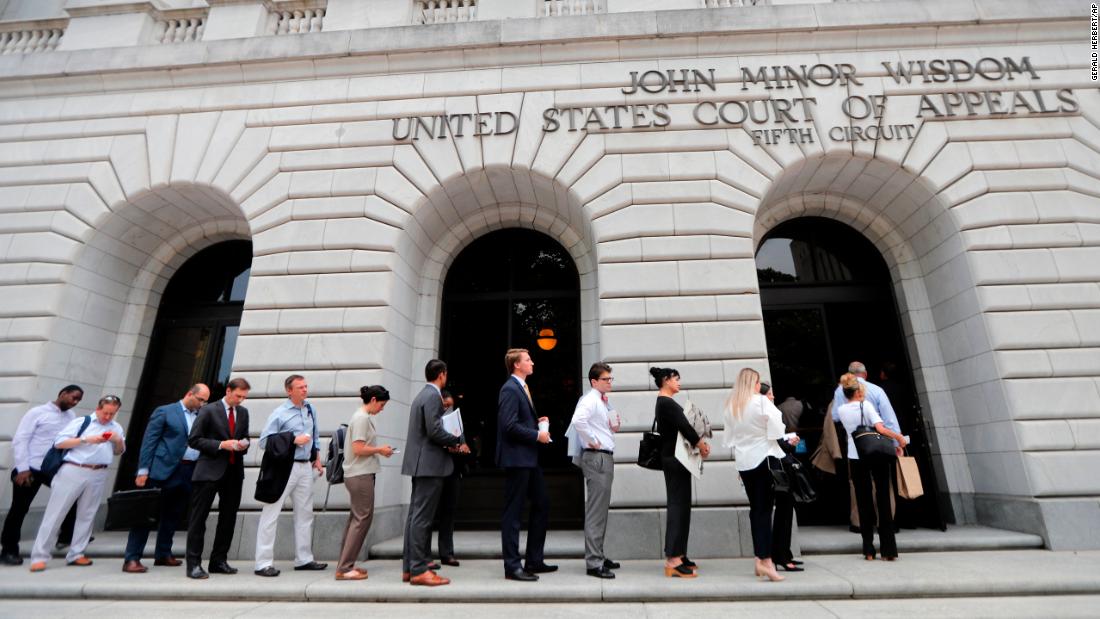[ad_1]
Such a ruling would threaten to wipe away coverage for millions of Americans and have a dramatic impact on a presidential race that is already focused on access to and costs of health care, nearly 10 years after President Barack Obama signed his signature domestic achievement.
Chief Justice John Roberts in 2012 famously upheld Obamacare by declaring it legal as a tax. But since the tax is now zero, conservatives say the law is doomed.
“If you no longer have the tax, why isn’t it unconstitutional?” Elrod asked.
If the challenge to the Affordable Care Act — filed by a group of 18 Republican states, led by Texas, and later joined by the Trump administration — is upheld, it would do what Trump and a GOP-led Congress failed to accomplish in 2017: take down Obamacare.
And while Trump has repeatedly said that people with pre-existing conditions, such as cancer and diabetes, would be covered even if the law is struck down, he has not issued any specific plans to do so.
“What happened in 2017 … is that Congress took away” — effectively undercut — the core of Roberts’ opinion calling it a tax, argued Texas Solicitor General Kyle Hawkins. Because of that, Roberts’ holding that the law is valid based on Congress’ taxing power is now “irrelevant,” Hawkins said.
The Democratic-led House of Representatives and a coalition of 21 Democratic states, led by California, argued that Congress hadn’t intended to kill the full law when it set the individual mandate tax penalty to zero. If Congress had wanted to nix other provisions, they argued, it would have done so as part of the same tax law.
“The entire Affordable Care Act can cooperate without the individual mandate,” said Samuel Siegel, California’s deputy solicitor general, noting that some lawmakers were clear at the time that they wanted only to act on the penalty.
Douglas Letter, arguing for the now-Democratic-controlled House of Representatives, said Texas and the other Republican-led states are exaggerating the effect of the tax law.
“Texas said ‘HA! — you just did something unconstitutional,’ ” Letter said.
Even though the tax penalty is now zero, Letter argued, people still have a choice: Buy insurance or don’t.
“That means the choice is still there,” he said. In fact, he argued, “there’s less coercion than there was before” to buy insurance.
Hawkins, for his part, rejected any interpretations of Congress’ intentions in 2017.
“I’m not in a position to psychoanalyze Congress,” he said.
Judge Carolyn Dineen King, a President Jimmy Carter appointee who’s the third member of the panel, asked no questions during the proceedings.
A ruling is not expected until later this year. The 5th US Circuit Court of Appeals is considered one of the most conservative appellate courts in the country, and the losing side is assured to appeal to the Supreme Court.
Engelhardt: Courts can’t be a ‘taxidermist’ for every major law
Engelhardt appeared to question why the fate of the Affordable Care Act was being left to judges instead of lawmakers.
If there’s a debate over what Congress intended first in 2010 and then in 2017, then Congress and the White House should clarify the issue, the judge said.
“There is a political solution here,” he said, adding that the courts should not be a “taxidermist” for every big-ticket law Congress passes.
The Senate, which remains Republican-controlled, did not join the case — a fact Engelhardt noted.
“There’s sort of an 800-pound gorilla that isn’t here,” he said during the hearing.
Letter countered that the House cannot “fix” the problem on its own, saying the Senate and Trump must also sign on — which they “obviously” would not — eliciting snickers in the courtroom.
Justice Department’s position challenged
Notably, the Trump administration is not defending the law. Initially, it argued that zeroing out the penalty invalidates only two of the law’s protections for those with pre-existing conditions — specifically, the provisions banning insurers from denying people policies or charging them more based on their medical histories.
Elrod and Engelhardt gave the administration a hard time in court Tuesday. They pressed the Justice Department’s attorney, August Flentje, on what would happen if the courts found that the law was unconstitutional.
Flentje said the administration is “appreciative” that the district judge put his ruling on hold, stressing that if the Affordable Care Act falls, a lot must be sorted out.
“It’s complicated,” he said, noting that the case should go through all the appeals first.
The judges questioned whether Obamacare could be invalidated only in the 18 states that brought the lawsuit, while remaining valid in the rest of the country.
Letter later jumped on Flentje’s ambiguous responses, saying the Department of Justice’s position makes no sense. It would be impossible to divide up certain provisions by state, Letter said, pointing out one that makes it easier to bring to market lower-cost versions of certain complex drugs.
Trump is pinning his hopes on the court striking down the law, allowing him to fulfill his campaign promise to repeal it. But congressional Republicans are keeping their distance, since it would give Democrats fodder to attack the GOP for not protecting those with pre-existing conditions — a hallmark of the law.
Obamacare saves senior citizens money on their Medicare coverage and prescription drugs. It lets many Americans obtain free birth control, mammograms and cholesterol tests. And it allows children to stay on their parents’ health insurance plans until they turn 26. Even the Trump administration is using the law to try to lower prescription drug prices.
The Affordable Care Act’s broad impact on the health care system is central to the arguments of both sides — with Texas saying the passage of the law has forced it to spend more money, and California charging that the law’s nullification would cost it money.
This story has been updated.
CNN’s Ariane de Vogue contributed to this report.
[ad_2]
Source link



